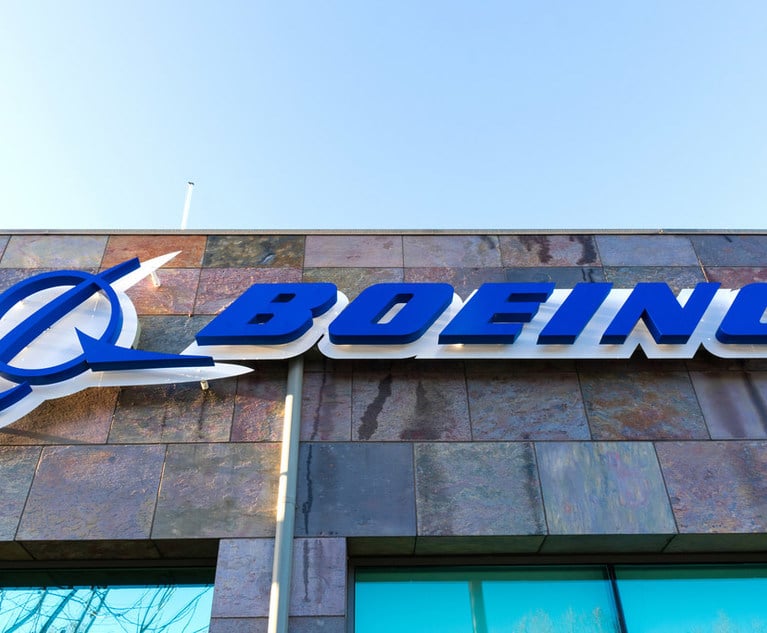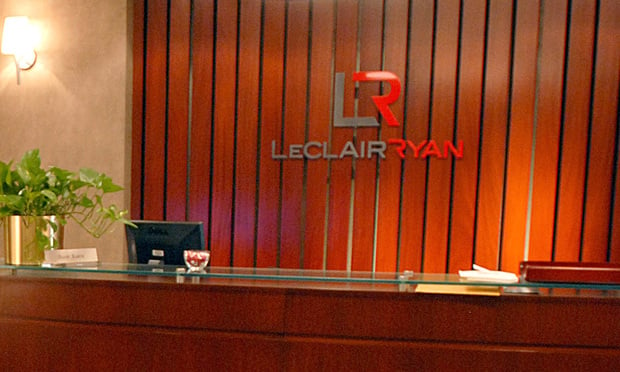Shearman, Wachtell Guide Defense Mega-Merger for Raytheon and UTC
President Trump questioned the deal Monday, but the companies have lawyers at the ready.
June 10, 2019 at 02:34 PM
3 minute read
 A Raytheon MIM-23 Hawk (i-Hawk) missile system belong to the Singapore Air Force sits on display at the 2018 Singapore Airshow. (Photo: Phuong D. Nguyen/Shutterstock.com)
A Raytheon MIM-23 Hawk (i-Hawk) missile system belong to the Singapore Air Force sits on display at the 2018 Singapore Airshow. (Photo: Phuong D. Nguyen/Shutterstock.com)
Raytheon, one of the U.S. government's largest military contractors, and United Technologies Corp. (UTC), an aerospace design and manufacturing company that also has strong military ties, are combining in an all-stock merger that promises to create a leviathan of military technology and equipment valued at $100 billion.
President Donald Trump sounded a skeptical note about the deal on CNBC on Monday, saying he was “a little concerned” that it could harm competition. Raytheon CEO Tom Kennedy countered that the companies are “complementary, not competitive.” (Kennedy will serve as executive chairman of the merged company, with current UTC leader Greg Hayes at the helm as CEO.)
Wachtell, Lipton, Rosen & Katz advised UTC on the deal, fielding a team led by 87-year-old firm co-founder Martin Lipton and corporate partners Joshua Cammaker, Edward Lee and Victor Goldfeld. Also on the deal are tax partner T. Eiko Stange, compensation and benefits partner Jeannemarie O'Brien and antitrust partner Damian Didden. Crowell & Moring served as lead U.S. antitrust counsel to UTC, led by partner Shawn Johnson and includes counsel Lauren Patterson and Martin J. Mackowski.
Raytheon turned to a Shearman & Sterling team led by M&A partners Clare O'Brien, Sean Skiffington and Cody Wright, along with compensation and benefits partner John Cannon, tax partner Laurence Bambino, antitrust partners David Higbee and Matthew Readings, litigation partners Alan Goudiss and Mallory Brennan, and IP transactions partner Jordan Altman.
The deal, which the companies described in Sunday's announcement as a merger of equals that would bring $18 billion to $20 billion to shareholders, will be finalized in the first half of 2020, after UTC completes a proposed split into three separate entities. The company is spinning off its elevator (Otis) and building manufacturing (Carrier) arms.
According to the companies' release, United Technologies share owners will own approximately 57 percent and Raytheon share owners will own approximately 43 percent of the combined company on a fully diluted basis.
The Shearman team had a previous relationship with Raytheon dating back to 2005, but the UTC merger dwarfs its past deals.
“Today is an exciting and transformational day for our companies, and one that brings with it tremendous opportunity for our future success. Raytheon Technologies will continue a legacy of innovation with an expanded aerospace and defense portfolio supported by the world's most dedicated workforce,” Kennedy said in a statement.
The combined company's headquarters are expected to be in the Boston area, where Raytheon is now based, in Waltham, Massachusetts. UTC, based in Farmington, Connecticut, is that state's largest private employer.
This content has been archived. It is available through our partners, LexisNexis® and Bloomberg Law.
To view this content, please continue to their sites.
Not a Lexis Subscriber?
Subscribe Now
Not a Bloomberg Law Subscriber?
Subscribe Now
NOT FOR REPRINT
© 2025 ALM Global, LLC, All Rights Reserved. Request academic re-use from www.copyright.com. All other uses, submit a request to [email protected]. For more information visit Asset & Logo Licensing.
You Might Like
View All


15-Lawyer LeClairRyan Aviation Team Jumps to Fox Rothschild

Trump to Sign CFIUS Reform Bill: What Dealmakers Need to Know
Trending Stories
- 1‘The Decision Will Help Others’: NJ Supreme Court Reverses Appellate Div. in OPRA Claim Over Body-Worn Camera Footage
- 2MoFo Associate Sees a Familiar Face During Her First Appellate Argument: Justice Breyer
- 3Antitrust in Trump 2.0: Expect Gap Filling from State Attorneys General
- 4People in the News—Jan. 22, 2025—Knox McLaughlin, Saxton & Stump
- 5How I Made Office Managing Partner: 'Be Open to Opportunities, Ready to Seize Them When They Arise,' Says Lara Shortz of Michelman & Robinson
Who Got The Work
J. Brugh Lower of Gibbons has entered an appearance for industrial equipment supplier Devco Corporation in a pending trademark infringement lawsuit. The suit, accusing the defendant of selling knock-off Graco products, was filed Dec. 18 in New Jersey District Court by Rivkin Radler on behalf of Graco Inc. and Graco Minnesota. The case, assigned to U.S. District Judge Zahid N. Quraishi, is 3:24-cv-11294, Graco Inc. et al v. Devco Corporation.
Who Got The Work
Rebecca Maller-Stein and Kent A. Yalowitz of Arnold & Porter Kaye Scholer have entered their appearances for Hanaco Venture Capital and its executives, Lior Prosor and David Frankel, in a pending securities lawsuit. The action, filed on Dec. 24 in New York Southern District Court by Zell, Aron & Co. on behalf of Goldeneye Advisors, accuses the defendants of negligently and fraudulently managing the plaintiff's $1 million investment. The case, assigned to U.S. District Judge Vernon S. Broderick, is 1:24-cv-09918, Goldeneye Advisors, LLC v. Hanaco Venture Capital, Ltd. et al.
Who Got The Work
Attorneys from A&O Shearman has stepped in as defense counsel for Toronto-Dominion Bank and other defendants in a pending securities class action. The suit, filed Dec. 11 in New York Southern District Court by Bleichmar Fonti & Auld, accuses the defendants of concealing the bank's 'pervasive' deficiencies in regards to its compliance with the Bank Secrecy Act and the quality of its anti-money laundering controls. The case, assigned to U.S. District Judge Arun Subramanian, is 1:24-cv-09445, Gonzalez v. The Toronto-Dominion Bank et al.
Who Got The Work
Crown Castle International, a Pennsylvania company providing shared communications infrastructure, has turned to Luke D. Wolf of Gordon Rees Scully Mansukhani to fend off a pending breach-of-contract lawsuit. The court action, filed Nov. 25 in Michigan Eastern District Court by Hooper Hathaway PC on behalf of The Town Residences LLC, accuses Crown Castle of failing to transfer approximately $30,000 in utility payments from T-Mobile in breach of a roof-top lease and assignment agreement. The case, assigned to U.S. District Judge Susan K. Declercq, is 2:24-cv-13131, The Town Residences LLC v. T-Mobile US, Inc. et al.
Who Got The Work
Wilfred P. Coronato and Daniel M. Schwartz of McCarter & English have stepped in as defense counsel to Electrolux Home Products Inc. in a pending product liability lawsuit. The court action, filed Nov. 26 in New York Eastern District Court by Poulos Lopiccolo PC and Nagel Rice LLP on behalf of David Stern, alleges that the defendant's refrigerators’ drawers and shelving repeatedly break and fall apart within months after purchase. The case, assigned to U.S. District Judge Joan M. Azrack, is 2:24-cv-08204, Stern v. Electrolux Home Products, Inc.
Featured Firms
Law Offices of Gary Martin Hays & Associates, P.C.
(470) 294-1674
Law Offices of Mark E. Salomone
(857) 444-6468
Smith & Hassler
(713) 739-1250









